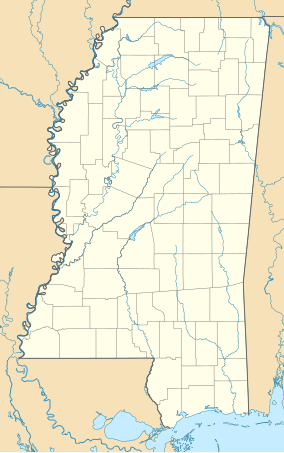Sam D. Hamilton Noxubee National Wildlife Refuge
| Noxubee National Wildlife Refuge | |
|---|---|
|
IUCN category IV (habitat/species management area)
|
|
 |
|
|
Map of the United States
Map of the United States
|
|
| Location | Mississippi, USA |
| Nearest city | Brooksville, Mississippi |
| Coordinates | 33°17′39.7608″N 88°46′43.6801″W / 33.294378000°N 88.778800028°WCoordinates: 33°17′39.7608″N 88°46′43.6801″W / 33.294378000°N 88.778800028°W |
| Area | 48,000 acres (190 km2) |
| Established | 1940 |
| Governing body | U.S. Fish and Wildlife Service |
| Website | Sam D. Hamilton Noxubee National Wildlife Refuge |
Sam D. Hamilton Noxubee National Wildlife Refuge is a 48,000 acres (190 km2) National Wildlife Refuge located in the U.S. state of Mississippi, in Noxubee, Oktibbeha, and Winston Counties. The refuge serves as a resting and feeding area for migratory birds and as example of proper land stewardship. Also, the refuge extensively manages land for the endangered red-cockaded woodpecker.
Land for the Noxubee NWR was obtained in the 1930s through the Resettlement Administration. During the 1930s, the land was controlled by the Bankhead-Jones Farm Tenant Act. In 1940, the land was established as a National Wildlife Refuge to ensure the wetlands would continue to be protected, providing migratory bird species and other animals a safe haven. Of the 48,000 acres (190 km2) of land, approximately 44,500 acres (180 km2) consists of bottomland and upland forest. A variety of species inhabit these lands including quail, deer, and turkey.
Two major lakes, Bluff with 1,200 acres (4.9 km2) and Loakfoma with 600 acres (2.4 km2) provide much of the wetlands within Noxubee. Additionally, there are four green tree reservoirs and sixteen smaller reservoirs which provide a habitat for wood stork, American alligator, bald eagle and other waterfowl.
The refuge partners with nearby Mississippi State University in an extensive research program with the Department of Wildlife and Fisheries and the Department of Forestry.
...
Wikipedia


